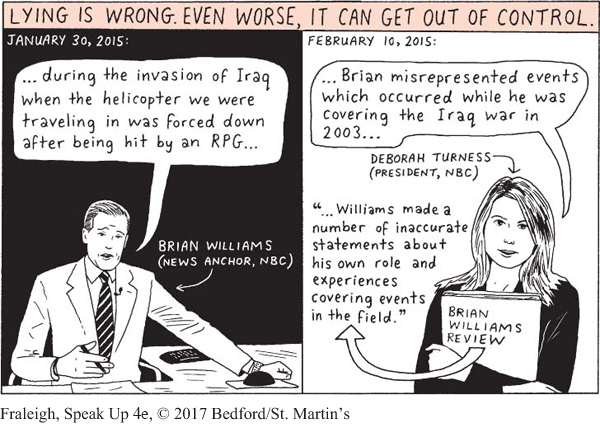Codes of Ethics: Absolute, Situational, and Culturally Relative
How do people make ethical choices? Some adopt a code of behavior that they commit to using consistently. These individuals are demonstrating ethical absolutism—the belief that people should exhibit the same behavior in all situations. For instance, you would be using ethical absolutism if you decided to tell your romantic partner how you really felt about the sweater. In this case, your code of ethics might contain a principle saying, “People should always tell the truth, even if doing so hurts loved ones.”
Page 69

Other people use situational ethics—a shifting code that suggests that ethics can vary depending on the situation at hand. For example, a student would (inappropriately) use situational ethics if she decided that under extenuating circumstances (say, a lack of time), it would be OK for her to plagiarize “just this once.”
Whether you tend to see ethical decisions in absolute or situational terms, there are some generalizations that apply in most situations. For example, most societies believe that it’s more ethical to tell the truth than to lie. In the context of public speaking, most people believe that lying is wrong. They see it as an ethical violation and in some circumstances a possible violation of the law.
Yet some of these same individuals might think little or nothing of intentionally exaggerating their qualifications during a job interview—
Page 70

In this book, we do not presume to tell you what your ethical system must be; we do insist, however, that you always strive to make the most ethical choice. To help you with such choices, in this chapter we expose you to the kinds of communication-
Ethics also can vary across societies, making them culturally relative.1 For example, in some cultures, people believe that knowledge is owned collectively rather than by individuals. In cultures with strong oral and narrative traditions, for example, stories are passed from one generation to another and are shared as general knowledge. Within such a system, people don’t consider working together or paraphrasing without attribution to be cheating or any other form of unethical behavior. By contrast, when discussing ethics in this book, we reflect a Western cultural perspective, which holds that individuals do own the knowledge they create. This perspective informs the academic guidelines and honor codes that are explicitly stated by most colleges and universities in the United States. Indeed, you often will find these guidelines cited in your instructors’ syllabi. Thus, we require proper citation and attribution of sources for all speeches.
Page 71
As you read on, consider your own approach to making ethical decisions while developing and delivering presentations. What are your beliefs regarding proper behavior in general and in public speaking in particular? Do you always honor these beliefs strictly, or do you do so only in certain situations? To help you answer these questions, let’s consider some of the ethical issues you may confront. These include communicating truthfully, crediting others’ work, using sound reasoning, and behaving ethically when you’re listening to someone else’s speech. Although making ethical choices in public speaking situations can sometimes be difficult, this chapter helps you develop a responsible system for doing so. The key word here is responsibility. Whenever you give a speech, you wield power—